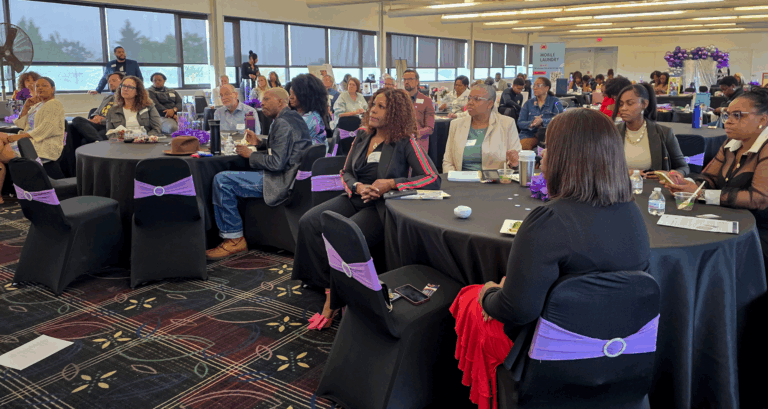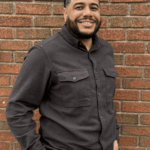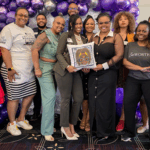
- Kim Kisner
- Community
- 11/24/2025
A Conversation With Carlos Martinez

People First Economy is a statewide organization working to redefine what success in business looks like—where profitability, community wellbeing, and environmental stewardship go hand in hand. Through education, measurement tools, and peer networks, the nonprofit helps Michigan businesses integrate social and environmental values into everyday operations.

SBN Detroit interviewed Carlos Martinez, president of People First Economy, about shifting business mindsets, the growing connection between sustainability and profitability, and why Michigan is uniquely positioned to lead the next economy.
Q: Tell me about People First Economy and how it came to be.
A: At its core, People First Economy is about building tools and support networks that help shape an economy where people and environmental well-being are essential. We never shy away from the idea of the triple bottom line — businesses can absolutely make a healthy profit while supporting the communities they serve and the environment they depend on.
We now serve more than 500 businesses statewide, from early-stage entrepreneurs to established companies. Much of our work centers on education and foundational business practices, but always through the lens of sustainability and inclusion.
We started as Local First, which focused on supporting locally owned companies. Over time, our mission expanded to include environmental and social impact — because local economies thrive when businesses are sustainable, equitable, and community-driven.
Q: As you work with cohorts, what mindset shifts do you see as companies move toward more inclusive, sustainable practices?
A: The biggest shift happens when leaders stop viewing sustainability as an add-on and start seeing it as core to their business strategy. Once companies begin measuring their social and environmental impact, they start acting more proactively. Sustainability becomes part of how they innovate, manage costs, and create value.
For larger or more mature businesses, this often leads to a broader cultural shift. They begin evaluating suppliers, employees, and even competitors differently — not as transactions, but as part of a shared ecosystem. That mindset unlocks collaboration and innovation. When companies realize that solving sustainability challenges can actually drive profitability, real transformation begins.
Q: What tangible benefits do companies see when they measure their social and environmental impacts?
A: One of the biggest is employee engagement. When people see that their company is making a positive difference, they feel connected to something larger than their job. We also see efficiency gains, cost savings from smarter resource management, and stronger brand loyalty.
But there’s another layer — storytelling. When businesses can measure their impact, they can share those results in powerful ways. It becomes part of their identity. For example, Walker-Miller Energy Services and Cascade Engineering in Michigan both demonstrate how sustainability and inclusion strengthen brand reputation and build employee pride.
More companies are now including impact reporting in their marketing or RFP materials because it helps them stand out. When you can prove your values, you open doors to new opportunities.

A Harvard study recently found that purpose-driven companies embedding sustainability into their culture outperform the market nearly tenfold over two decades. That connection between purpose and profit is real. The business impact strategies create lasting value when they’re grounded in a deep understanding of a company’s financial metrics.
Q: How do you encourage businesses to think about long-term value rather than short-term profit?
A: This is always an evolving conversation, especially in challenging economic times. The key is understanding that we’re all interconnected. A diverse, resilient business community helps protect against national downturns and future disruptions.
Companies that invest early in sustainable, innovative practices often find themselves better positioned when the market shifts. Patagonia is a good example — years ago, they were experimenting with regenerative agriculture, which at the time seemed niche. Today, it’s a standard for sustainable production.
When you build trust, brand loyalty, and local supply chains, it creates stability. Over the long term, that stability translates to profitability.
Q: Detroit and Michigan have a rich manufacturing legacy. How is the people-first model reshaping the regional narrative around business and jobs?
A: Detroit is unique because it already has a strong foundation of community-based leadership. Other states look to Detroit as a model for what’s possible when innovation and inclusion go hand in hand.
We’re still early in the process of embedding this mindset more broadly, but the momentum is there. When we opened applications for our latest sustainability cohort, we had more than 50 applicants for just 20 spots — which tells us there’s real appetite for this work.
Our broader goals include connecting early-stage businesses with those further along in their sustainability journey — through tools, mentorship, and experiences like conferences where they can see what’s possible. It’s about building a community of practice. The more we connect those dots, the stronger our local economy becomes.
Q: If you were advising a mid-size company in Detroit today, what’s the best first step toward embedding people-first practices?
A: Start by understanding where you are. We always recommend beginning with a sustainability or impact assessment.
Then pick one or two achievable goals, such as improving employee benefits, reducing waste, or sourcing locally. Progress happens through small, transparent steps, not perfection.
I’m an entrepreneur myself, and when I first took an assessment myself, I panicked — but that’s the point. It’s about identifying opportunities for improvement, not judgment. Once you see where you can make a change, momentum builds. It’s a marathon, not a sprint.
Q: Where do you see the biggest growth opportunities for Michigan businesses in the next five years?
A: Growth lies at the intersection of sustainability, equity, and innovation. The clean energy transition alone represents a multi-trillion-dollar opportunity. There’s also growing potential in circular manufacturing and workforce development and worker-owned cooperatives.
We need to make sure those opportunities are equitable. Detroit has a majority Black population, and Michigan has several key regions with strong, diverse, but underserved communities. As major investments flow into green energy and infrastructure, it’s vital that local entrepreneurs and workers share in that growth.
This is still a foundational phase. Some of the biggest wins will take seven to ten years to materialize, but we have to invest in education, innovation, and access to capital now — and create space for experimentation and even failure. That’s how lasting change happens.
Q: If you could change one business practice tomorrow to create a more just economy, what would it be?
A: I would convince every decision-maker that sustainability isn’t a side initiative — it’s the best way to innovate for the future. When you integrate social and environmental impact into your business strategy, you hold yourself accountable to more than profits.
That’s what a people-first economy really is — one that values dignity, long-term wealth, and shared prosperity. We need enough bold companies to make those big bets. That’s how we’ll build an economy that truly works for everyone. If we build businesses that measure what matters, we can build an economy that truly works for everyone.
Be sure to subscribe to our newsletter for regular updates on sustainable business practices in and around Detroit.
Kim Kisner
- All
- Business
- Community
- Education
- Events

Unique Monique Scented Candles, a Detroit-based business founded by Monique Bounds., aims to produce candles and household products with clean ingredients and local supply chains. What began as a personal hobby during college has evolved into a full-time venture producing coconut oil and soy-based candles made with essential oils and locally sourced materials. SBN Detroit interviewed Bounds about launching a sustainable product line, sourcing challenges in Michigan, and...

Eastern Market Partnership, in collaboration with the City of Detroit’s Office of Sustainability Urban Agriculture Division, has announced $240,000 in grant funding to support Detroit-based farmers and farmer collectives. The grants will advance food access, climate education, sustainable land use, and economic opportunity, with priority given to Black- and Indigenous-led farms, youth-led initiatives, and projects rooted in historically disinvested neighborhoods. The recipients – ranging from cooperatives and community...

Citizen Robotics is a Detroit-based nonprofit that advances the use of robotics and digital manufacturing in residential construction, focusing on improving productivity, sustainability, and long-term affordability. Best known for its early work in 3D-printed housing, it explores how alternative construction methods and new financial models can reduce material waste, lower lifetime operating costs, and enhance the resilience of homes. SBN Detroit interviewed Tom Woodman, founder and president of...







